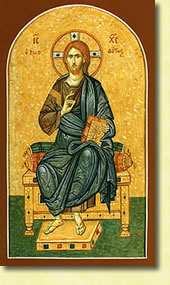 One of the most difficult concepts for students of theology to get their heads around is the orthodox doctrine of the incarnation. Students generally are willing to affirm that Jesus Christ is a single person (against Nestorianism), that he is “God become a human being” and not a human being in whom God was especially present (against adoptionism), that he is fully God and fully human (Chalcedon); however, I have found that concerns arise when some of the affirmations of the later Councils are discussed. Affirmations of ditheletism (that Christ has two intellect and wills, one human and one divine) and anhypostasia (that because Christ is a single divine person, he has no distinct human person) create puzzlement. In an email conversation with a well-known contemporary Evangelical theologian, I was once told that the notion that Jesus had both a divine intellect and will and a human intellect and will sounded like “Nestorianism.” More recently, a student complained that saying that Jesus was not a human person sounded like Apollinarianism. A student sent me an email awhile back, raising some of these questions, and I have belatedly responded:
One of the most difficult concepts for students of theology to get their heads around is the orthodox doctrine of the incarnation. Students generally are willing to affirm that Jesus Christ is a single person (against Nestorianism), that he is “God become a human being” and not a human being in whom God was especially present (against adoptionism), that he is fully God and fully human (Chalcedon); however, I have found that concerns arise when some of the affirmations of the later Councils are discussed. Affirmations of ditheletism (that Christ has two intellect and wills, one human and one divine) and anhypostasia (that because Christ is a single divine person, he has no distinct human person) create puzzlement. In an email conversation with a well-known contemporary Evangelical theologian, I was once told that the notion that Jesus had both a divine intellect and will and a human intellect and will sounded like “Nestorianism.” More recently, a student complained that saying that Jesus was not a human person sounded like Apollinarianism. A student sent me an email awhile back, raising some of these questions, and I have belatedly responded:
I’m still stuck on the single personhood of Christ in the face of two natures. I understand the distinction (the who vs. the what) and the necessity to keep either from being diminished/replaced by the other. But I’m struggling with how to understand someone with two wills, two knowledges, two ontologies, as a single anything. I know at some point we plead mystery, but I want to get as close as I can before I do.
Concerning personhood, I think the following is necessary:
a) A person is absolutely unique. There are many human beings, but there is only one unique Bill Witt or D___ S___ (name omitted).
b) A person is consciously aware, and the source of his or her own actions.
c) A person knows and wills and, on that basis, is able to act in a responsible manner.
d) A person is relational – specifically a person is in relation to other persons as I and you.
e) For all of the above reasons, a person is a “some one” rather than a “some thing.”
Where things get confusing for us is that in the only cases of personhood of which we have immediate experience (that of fellow human beings), every person is an embodied individual with a single intellect and will. If there is more than one intellect and will, there is more than one person. (more…)





